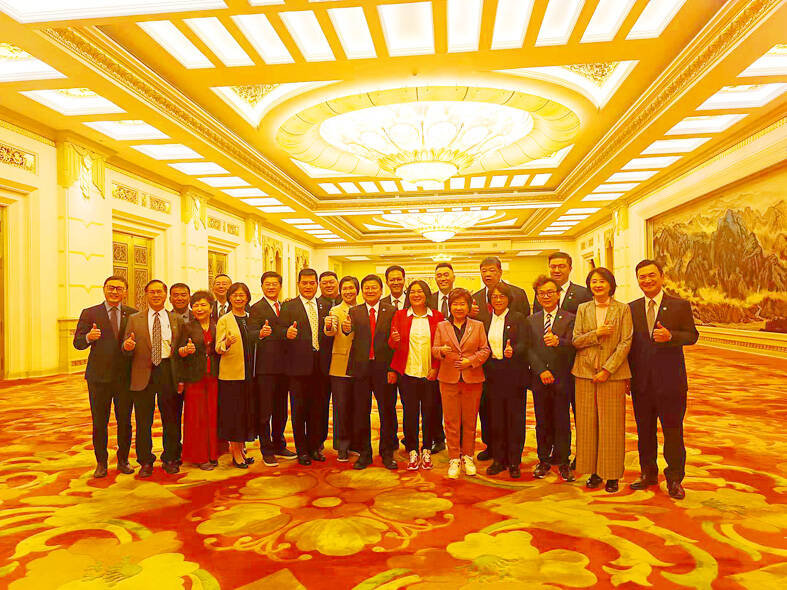A legislative delegation led by Chinese Nationalist Party (KMT) caucus whip Fu Kun-chi (傅崑萁) met with Chinese People’s Political Consultative Conference Chairman Wang Huning (王滬寧) in Beijing yesterday.
Wang hailed the delegation’s visit at the start of Taiwan’s legislative session as a significant and symbolic gesture, adding that people on both sides of the Strait should engage in more exchanges.
“We are all Chinese and are one family as parts of the Zhonghua minzu [中華民族, Chinese ethnic group],” said Wang, who was accompanied by Taiwan Affairs Office (TAO) Director Song Tao (宋濤).

Photo courtesy of Fu’s offices
Wang said during the meeting that both sides should uphold the so-called “1992 consensus” and the “one China” principle, adding that both sides should stand against attempts by Taiwanese independence groups to split Taiwan and China apart.
In response, Fu said his visit was a sign of the Taiwanese public’s will to return cross-strait relations to pre-2016 levels of trade and business collaboration.
After the severing of ties over the past eight years, Taiwanese businesses welcomed Chinese “to visit Taiwan, get to know Taiwan and fall in love with Taiwan,” he said.
After the meeting, the TAO held a banquet for Fu and other legislators at the Diaoyutai State Guesthouse.
Meanwhile, TAO spokesperson Zhu Fenglian (朱鳳蓮) announced later yesterday that China is willing to donate prefabricated houses to Hualien County via the Red Cross Associations on both sides of the Strait in hopes of alleviating the damage caused by the April 3 earthquake and its aftershocks.
The “1992 consensus” refers to a tacit understanding between the Chinese Nationalist Party (KMT) and the Chinese Communist Party (CCP) that both sides of the Taiwan Strait acknowledge that there is “one China,” with each side having its own interpretation of what “China” means.

Taiwanese can file complaints with the Tourism Administration to report travel agencies if their activities caused termination of a person’s citizenship, Mainland Affairs Council Minister Chiu Chui-cheng (邱垂正) said yesterday, after a podcaster highlighted a case in which a person’s citizenship was canceled for receiving a single-use Chinese passport to enter Russia. The council is aware of incidents in which people who signed up through Chinese travel agencies for tours of Russia were told they could obtain Russian visas and fast-track border clearance, Chiu told reporters on the sidelines of an event in Taipei. However, the travel agencies actually applied

Japanese footwear brand Onitsuka Tiger today issued a public apology and said it has suspended an employee amid allegations that the staff member discriminated against a Vietnamese customer at its Taipei 101 store. Posting on the social media platform Threads yesterday, a user said that an employee at the store said that “those shoes are very expensive” when her friend, who is a migrant worker from Vietnam, asked for assistance. The employee then ignored her until she asked again, to which she replied: "We don't have a size 37." The post had amassed nearly 26,000 likes and 916 comments as of this

New measures aimed at making Taiwan more attractive to foreign professionals came into effect this month, the National Development Council said yesterday. Among the changes, international students at Taiwanese universities would be able to work in Taiwan without a work permit in the two years after they graduate, explainer materials provided by the council said. In addition, foreign nationals who graduated from one of the world’s top 200 universities within the past five years can also apply for a two-year open work permit. Previously, those graduates would have needed to apply for a work permit using point-based criteria or have a Taiwanese company

The Shilin District Prosecutors’ Office yesterday indicted two Taiwanese and issued a wanted notice for Pete Liu (劉作虎), founder of Shenzhen-based smartphone manufacturer OnePlus Technology Co (萬普拉斯科技), for allegedly contravening the Act Governing Relations Between the People of the Taiwan Area and the Mainland Area (臺灣地區與大陸地區人民關係條例) by poaching 70 engineers in Taiwan. Liu allegedly traveled to Taiwan at the end of 2014 and met with a Taiwanese man surnamed Lin (林) to discuss establishing a mobile software research and development (R&D) team in Taiwan, prosecutors said. Without approval from the government, Lin, following Liu’s instructions, recruited more than 70 software